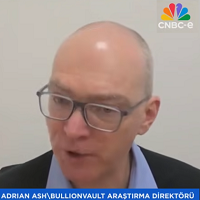The High Price of Optimism
Investing means staying the course, sure. But be realistic...
VICE ADMIRAL James Stockdale has a good claim to have been one of the most extraordinary, not to say one of the bravest, Americans ever to have lived, writes Tim Price at Price Value Partners.
On September 9th, 1965 he was shot down over North Vietnam and seized by a mob. Having broken a bone in his back ejecting from his plane he had his leg broken and his arm badly injured. He would spend the next seven years in Hoa Lo Prison, the infamous "Hanoi Hilton".
The physical brutality was unspeakable, and the mental torture never stopped. He would be kept in solitary confinement, in total darkness, for four years. He would be kept in heavy leg-irons for two years, on a starvation diet, deprived even of letters from home.
Throughout it all, Stockdale was stoic.
When told he would be paraded in front of foreign journalists, he slashed his own scalp with a razor and beat himself in the face with a wooden stool so that he would be unrecognisable and useless to the enemy's press.
When he discovered that his fellow prisoners were being tortured to death, he slashed his wrists to show his torturers that he would not submit to them.
When his guards finally realised that he would die before cooperating, they relented. The torture of American prisoners ended, and the treatment of all American prisoners of war improved.
After being released in 1973, Stockdale was awarded the Medal of Honour. He was one of the most decorated officers in US naval history, with 26 personal combat decorations, including four Silver Stars.
Jim Collins, author of the influential study of US businesses, 'Good to Great', interviewed Stockdale during his research for the book. How had he found the courage to survive those long, dark years?
"I never lost faith in the end of the story," replied Stockdale.
"I never doubted not only that I would get out, but also that I would prevail in the end and turn the experience into the defining moment of my life, which in retrospect, I would not trade."
Collins was silent for a few minutes. The two men walked along, Stockdale with a heavy limp, swinging a stiff leg that had never properly recovered from repeated torture. Finally, Collins went on to ask another question. Who didn't make it out?
"Oh, that's easy," replied Stockdale. "The optimists."
Collins was confused.
"The optimists. Oh, they were the ones who said, 'We're going to be out by Christmas.' And Christmas would come, and Christmas would go. Then they'd say, 'We're going to be out by Easter.' And Easter would come, and Easter would go. And then Thanksgiving. And then it would be Christmas again. And they died of a broken heart."
As the two men walked slowly onward, Stockdale turned to Collins.
"This is a very important lesson. You must never confuse faith that you will prevail in the end – which you can never afford to lose – with the discipline to confront the most brutal facts of your current reality, whatever they might be."
As Collins' book came to be published, this observation came to be known as the Stockdale Paradox. For Collins, it was exactly the same sort of behaviour displayed by those company founders who had led their businesses through thick and thin. The alternative was the average managers at also-ran companies that generated average returns at best, or which failed completely.
And we have had interest rates held at emergency levels for over a decade – igniting inflationary problems that are now all too visible, not least in the bond market. Central bankers are now trapped in a monetary policy killing pen of their own design; they cannot afford to raise rates to the levels realistically required, and pivoting back to cutting rates will destroy the last vestiges of policy credibility and currency stability.
What are the implications for global asset allocation and stock selection?
Both in absolute terms and relative to equities, most bond markets are collapsing in real time. Ever since the risk-free rate became the return-free risk, and given the dismal outlook for higher inflation, especially after new Middle Eastern conflict, stocks now look like the only game in town (aside from commodities, of course), and value stocks the most favourable tactic for playing that game.
As regards stock markets, price is what you pay, and value (or lack thereof) is what you get. On any fair analysis, the US market in particular is a fly in search of a windscreen. Using Professor Robert Shiller's cyclically adjusted price / earnings ratio for the broad US stock market (currently 29.8x), shown below, US stocks have only been more expensive than they are today a handful of times in the past 130 years: in 2000, when they briefly traded at 44x, and more recently, just before the scamdemic. We are now "merely" back to 1929 pre-Crash levels, at around 30x.
The peak-to-trough fall for the Dow Jones Industrial Average from 1929, for example (when the market hit a Shiller p/e of only 30x), equated to 89%. The peak-to-trough fall for the Dow from 2000 equated to "just" 38%. Time will tell just how disappointing (both by scale and by duration) the coming years will be for US equity market and growth stock bulls.
Vice Admiral Stockdale was unequivocal: while we need to confront the "brutal facts" of the marketplace, we also need to keep faith that we will prevail. To us, that boils down to avoiding conspicuous overvaluation (in most bond markets, for example, and a significant portion of the developed equity markets) and embracing equally conspicuous value – where current poor sentiment is likely to intensify subsequent upside returns. In this uniquely oppressive financial environment, with the skies darkening with the risks of sovereign debt default, or reset, we think innocent optimism could be fatal. Or as Warren Buffett once observed,
"You pay a very high price in the stock market for a cheery consensus."
We also seek portfolio diversification in uncorrelated assets (in our case, systematic trend-following funds) and, increasingly, in real assets (sensibly priced, hugely cash-generative listed businesses which derive the bulk of their earnings from the processing and provision of commodities, notably gold and silver).
Elroy Dimson, Mike Staunton, and Paul Marsh titled their classic study of equity market returns for the 20th Century 'Triumph of the Optimists'. It seems to us that in the months and years to come, realists may yet have the last laugh.









 Email us
Email us